History
In the 1830s, as a teenager, James Smith left Scotland for the United States and established a business selling the new American type of enclosed cooking ranges and stoves in Jackson, Mississippi.
Realizing these innovative products offered significant advantages in efficiency and cleanliness over the open fires commonly used in Europe, he returned to his native land, and arranged for the manufacture of his own versions, initially at the Bonnybridge foundry of George Ure.
In 1854 Ure, Smith and a third partner, Stephen Wellstood, formed 'Smith & Wellstood' as a new company and named a branch in honour of the land found by Columbus: 'The Columbian Stove Works'. The 'Esse' brand name was chosen simply because it was thought to sound French, and being derived from the Latin, to be thoroughly European.
The business prospered throughout the 19th and early 20th centuries, so that the company were able to claim that every single Royal household in Europe owned an Esse, and included Auguste Escoffier, Mrs Beeton, Florence Nightingale and Ernest Shackleton among their famous clients.
Today, Esse Range Cookers, Cook Stoves and Stoves are made in Barnoldswick, Lancashire, England.

A portable stove is a cooking stove specially designed to be portable and lightweight, used in camping, picnicking, backpacking, or other use in remote locations where an easily transportable means of cooking or heating is needed. Portable stoves can be used in diverse situations, such as for outdoor food service and catering and in field hospitals.
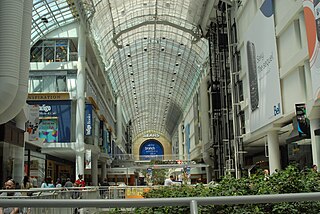
A shopping center in American English, shopping centre in Commonwealth English, shopping complex, shopping arcade, shopping plaza, or galleria, is a group of shops built together, sometimes under one roof.

An oven is a tool that is used to expose materials to a hot environment. Ovens contain a hollow chamber and provide a means of heating the chamber in a controlled way. In use since antiquity, they have been used to accomplish a wide variety of tasks requiring controlled heating. Because they are used for a variety of purposes, there are many different types of ovens. These types differ depending on their intended purpose and based upon how they generate heat.
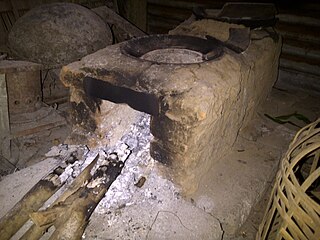
A stove or range is a device that generates heat inside or on top of the device, for -local heating or cooking. Stoves can be powered with many fuels, such as natural gas, electricity, gasoline, wood, and coal.

A kitchen stove, often called simply a stove or a cooker, is a kitchen appliance designed for the purpose of cooking food. Kitchen stoves rely on the application of direct heat for the cooking process and may also contain an oven, used for baking. "Cookstoves" are heated by burning wood or charcoal; "gas stoves" are heated by gas; and "electric stoves" by electricity. A stove with a built-in cooktop is also called a range.
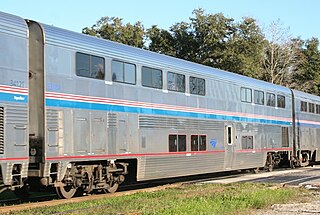
A passenger railroad car or passenger car, also called a passenger carriage, passenger coach, or passenger bogie is a railroad car that is designed to carry passengers, usually giving them space to sit on train seats. The term passenger car can also be associated with a sleeping car, a baggage car, a dining car, railway post office and prisoner transport cars.
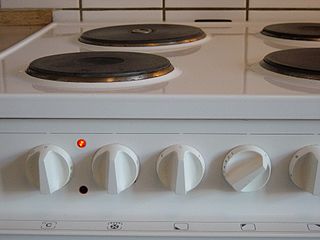
An electric stove, electric cooker or electric range is a stove with an integrated electrical heating device to cook and bake. Electric stoves became popular as replacements for solid-fuel stoves which required more labor to operate and maintain. Some modern stoves come in a unit with built-in extractor hoods.

The Coleman Company, Inc. is an American brand of outdoor recreation products, especially camping gear, now owned by Newell Brands. The company's new headquarters are in Chicago, and it has facilities in Wichita, Kansas, and in Texas. There are approximately 4,000 employees. Some of the products manufactured are portable stoves, lanterns, coolers, sleeping bags, camp chairs, and shelters.

Magic Chef, Inc. is an appliance brand currently owned by CNA International Inc.

Corning Ware, also written CorningWare, was originally a brand name for a unique glass-ceramic (Pyroceram) cookware resistant to thermal shock. It was first introduced in 1958 by Corning Glass Works in the United States. The brand was later spun off with the sale of the Corning Consumer Products Company subsidiary, now known as Corelle Brands.

Bonnybridge is a village in the Falkirk council area of Scotland. It is 4.0 miles (6.4 km) west of Falkirk, 5.3 miles (8.5 km) north-east of Cumbernauld and 8.3 miles (13.4 km) south-southwest of Stirling. The village is situated near the Bonny Water which runs through the town and lies north of the Forth and Clyde Canal. To the south-east of Bonnybridge is a well-preserved section of the Antonine Wall, and the remnants of Rough Castle Fort, the most complete of the surviving Roman forts of the wall.
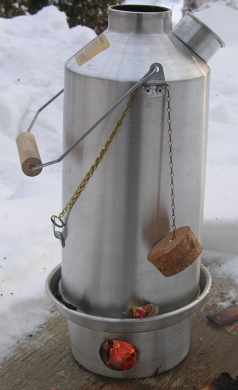
Kelly Kettle, Storm Kettle, Ghillie Kettle, Thermette, Survival Kettle and Volcano Kettle are trade names for portable devices for boiling water outdoors using twigs and other small combustible materials; these devices consist of a water jacket surrounding a fire chamber which creates an upward chimney draft ensuring efficient and rapid boiling even in windy or wet weather.
A burdei or bordei is a type of pit-house or half-dugout shelter, somewhat between a sod house and a log cabin. This style is native to the Carpathian Mountains and forest steppes of Eastern Europe.
The Dilmaghani family, the oldest existing manufacturers of hand knotted carpets and oriental rugs, can be traced back to the 1850s Qajar dynasty, Persia. In an industry which largely produces untitled items often identifiable only by experts, the history and lineage of any name relating to specific types of rugs for so many decades is unusual. Through the 1960s, the Dilmaghani family was still designing, manufacturing and importing Persian carpets from Iran to the United States. Dilmaghani is seen as an important connection of 19th and 20th century Persian rug and carpet production in and around the cities of Tabriz and Kermān. Dilmaghani remained as of 1980 among the best known names of branded hand knotted carpets.
The Moffat Stove Company, Limited was established in 1892 in Weston, Toronto, Ontario and manufactured stoves and ranges that have been widely distributed across the continent and even used extensively in Europe and Asia. Moffat Stoves are credited with inventing the first electric ranges for the domestic market. And although the Moffat family sold the business in 1953, stoves and refrigerators continued to be built at the Weston plant until the early 1970s.

Wolf Steel Ltd., better known as Napoleon, is the largest privately-owned manufacturer of fireplaces, grills, and gas furnaces in North America. Based in Barrie, Ontario, Napoleon began in 1976 as a steel fabrication business under the name Wolf Steel Ltd. In 1995, Napoleon was founded after the company diversified its production to include outdoor heating products.
United States Stove Company is an American manufacturer based in South Pittsburg, Tennessee that produces residential wood burning and pellet burning stoves and sells stove accessories and parts. Founded in 1869 by John S. Perry and S.L Rogers, the United States Stove Company is one of the largest manufacturers of both wood and pellet stoves in the United States, with its headquarters located in South Pittsburg, Tennessee.













